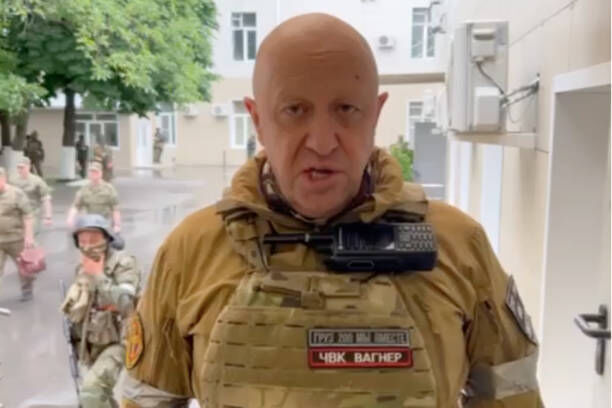The Unanswered Questions of Yevgeny Prigozhin's Unpunished Rebellion
President Vladimir Putin revealed the state paid Wagner almost $1 billion in just one year, while Mr. Prigozhin's other company earned about the same from government contracts, raising questions of how the government could fund such a private company.
Russia's rebellious mercenary chief Yevgeny Prigozhin walked free from prosecution for his June 24 armed mutiny, with no charges facing anyone for the attempted uprising or the deaths of soldiers killed in it.
A campaign is underway to portray the founder of the Wagner Group as driven by greed, with only hints of an investigation into whether he mishandled any of the billions of dollars in state funds.
President Vladimir Putin revealed the state paid Wagner almost $1 billion in just one year, while Mr. Prigozhin's other company earned about the same from government contracts, raising questions of how the government could fund such a private company.
Russian business daily Vedomosti cited a source close to the Defence Ministry as saying the earnings occurred between 2014 and 2023, years when both Prigozhin and Russian officials denied any ties to Wagner or even its existence.
State TV programs alleged Prigozhin's adult children amassed significant wealth through him and showed video of searches of his St. Petersburg offices and an opulent mansion he purportedly owned, complete with helipad and indoor swimming pool.
The goal of these revelations is “to smear the person, show he is an oligarch,” said Ilya Shumanov, Russia director for Transparency International. Shumanov told AP that Wagner was likely funded either with cash through shell companies, or through government contracts via Mr. Prigozhin's other entities.
It is unclear how much was paid, he noted, but added it was clear Mr. Putin's remarks “gave a green light” to investigate the Wagner chief's finances. The deal struck with Mr. Prigozhin to end the uprising stipulated that the Federal Security Service, or FSB, would drop charges against him and his fighters of mounting a rebellion.
That agreement went against Putin's vow in a nationally televised address during the uprising to punish those behind it. Instead, the Kremlin said Mr. Prigozhin agreed to end the mutiny and go to Belarus — a settlement that didn't sit well with some.
Thousands of people “rolling toward Moscow on tanks shoot down aircraft, kill 15 troops. … The president speaks, says: I will punish all of you, you are mutineers,' the FSB launches a case -– and then nothing,” said St. Petersburg municipal council member Nikita Yuferev.
Whether other charges will be filed is unclear. Prominent lawyer Ivan Pavlov told AP that mounting an armed rebellion is only one charge, and that Mr. Prigozhin may face others -– especially since deaths occurred — but so far, “no one is talking about it.”
Russian security experts Andrei Soldatov and Irina Borogan said the FSB's Rostov department “barricaded itself in its city headquarters,” while its military counterintelligence operatives assigned to Wagner ”did nothing.” Mark Galeotti of University College, London, an analyst on Russian security affairs, said the rebellion tested previous assumptions that Putin could count on his security forces.
"Now, the first time there's a real challenge we actually see, security forces are willing to hang back and wait and see what happens,” he told AP. So far, there has been no negative impact on the FSB, which Galeotti called “Mr. Putin's favoured institution,” having been a former member. Kremlin spokesman Dmitry Peskov said Monday that security services “perform their functions, they do it properly.”
He also noted Putin last week had praised soldiers, law enforcement and security officers and “expressed his gratitude” to them. The developments around Mr. Prigozhin, who remains unpunished despite Mr. Putin's labelling of his revolt as treason, underscored what St. Petersburg municipal council member Nikita Yuferev called the “gradual erosion of the legal system” in Russia.
Andrei Kolesnikov, a senior fellow at the Carnegie Russia Eurasia Center, writing about the mutiny in a column, concluded: “The fabric of the state is disintegrating.” Whether anyone will be punished for the deaths of the Russian troops who died at the hands of Mr. Prigozhin's fighters is still unclear.
So is whether Mr. Prigozhin will move to Belarus, Moscow's closest ally, under a deal with the Kremlin to end the rebellion. The revelations raised questions of how the government could fund Wagner at all, given that laws prohibit mercenary activities, including funding and training private troops, that put the company in a legal gray area.




